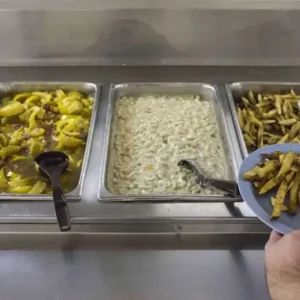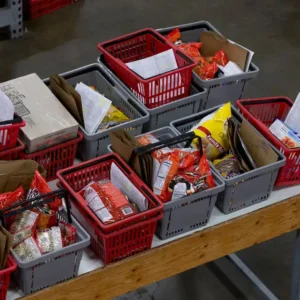What food do they serve in jail in the UK
Have you ever wondered what kind of food is served in jails across the United Kingdom?
The daily meals provided to inmates are not just about sustenance; they are also an essential aspect of the prison system’s operations and regulations.
In this article, we’ll take a closer look at the meals served to prisoners in UK prisons. From breakfast to dinner, and everything in between, we’ll explore the types of food inmates can expect, the nutritional aspects, and how special dietary needs are accommodated. Join us as we uncover the details behind what’s on the menu in UK prisons.

What’s on the Menu?
1. Breakfast
Breakfast is the most important meal of the day, even in prison. In UK prisons, inmates are typically served a modest breakfast that includes cereal, porridge, toast, and a hot beverage. This simple start to the day ensures prisoners get the energy they need for the morning ahead.
2. Lunch
For lunch, prisoners are provided with a hot meal that often includes options like casseroles, stews, or pasta dishes. These meals are designed to be nutritious and filling, providing inmates with essential vitamins and minerals. Lunch is an important part of the day, giving prisoners a chance to refuel and socialize.
3. Dinner
Dinner in UK jails is another hot meal, usually served in the early evening. Similar to lunch, the dinner menu includes a variety of dishes, such as meat with vegetables, fish, or vegetarian options. The goal is to offer balanced meals that contribute to prisoners’ health and well-being.
Snacks and Additional Items
Throughout the day, prisoners may have access to snacks such as fruit, yogurt, or sandwiches. These items supplement the main meals and provide additional nutrition.
Special Dietary Needs
Prisons in the UK accommodate special dietary needs, including vegetarian, halal, kosher, and medical diets. This ensures that all prisoners have access to food that aligns with their cultural, religious, or medical requirements.
How is Prison Food Prepared?
Prison meals are prepared on-site by trained kitchen staff. These kitchens operate under strict health and safety guidelines to ensure the quality and hygiene of the food. Ingredients are sourced locally whenever possible, supporting nearby farmers and producers.
Challenges and Controversies
i. Nutritional Concerns
While efforts are made to provide balanced meals, some critics argue that the nutritional content of prison food could be improved. High-calorie, high-sugar foods are limited, but the overall quality of the meals can vary from one facility to another.
ii. Food Quality
Another common concern is the perceived quality of the food. While efforts are made to provide nutritious meals, the taste and presentation of prison food can vary. Some inmates may find the food bland or unappetizing, which can affect their overall well-being.
FAQs
1. What are typical meals served in UK jails?
In UK jails, meals typically include items like cereal, porridge, toast, and a hot beverage for breakfast. Lunch and dinner often consist of hot meals such as casseroles, stews, pasta dishes, and meat or vegetarian options with vegetables.
2. Are there vegetarian or special dietary options available in UK jails?
UK jails provide meals that cater to various dietary needs, including vegetarian, halal, kosher, and medical diets. Inmates can request these options if they have specific dietary requirements.
3. Who prepares the food served in UK jails?
Food in UK jails is prepared by trained kitchen staff who work under strict health and safety guidelines to ensure the quality and hygiene of the meals.
4. How is the nutritional content of prison food regulated?
The nutritional content of prison food is regulated by the Ministry of Justice in the UK. Efforts are made to provide balanced meals that meet the dietary needs of inmates, although there are occasional concerns about the quality and variety of the food.
5.How is food waste managed in UK jails?
Efforts are made to minimize food waste in UK jails by carefully planning meals and portion sizes. Any excess food that is safe for consumption is often donated to local charities or food banks.
6. Are there any restrictions on what inmates can receive in terms of food packages or parcels?
There are restrictions on what inmates can receive in terms of food packages or parcels. This is to ensure that the food is safe and does not contain contraband items. Typically, inmates can receive items like snacks, sweets, and other non-perishable food items.
Conclusion
The food served in UK jails is designed to be nutritious, balanced, and suitable for a diverse range of dietary needs. While there are challenges and controversies surrounding prison food, efforts are continuously made to improve the quality and variety of meals served to inmates. By understanding what’s on the menu in UK jails, you gain insight into a lesser-known aspect of the prison system.





